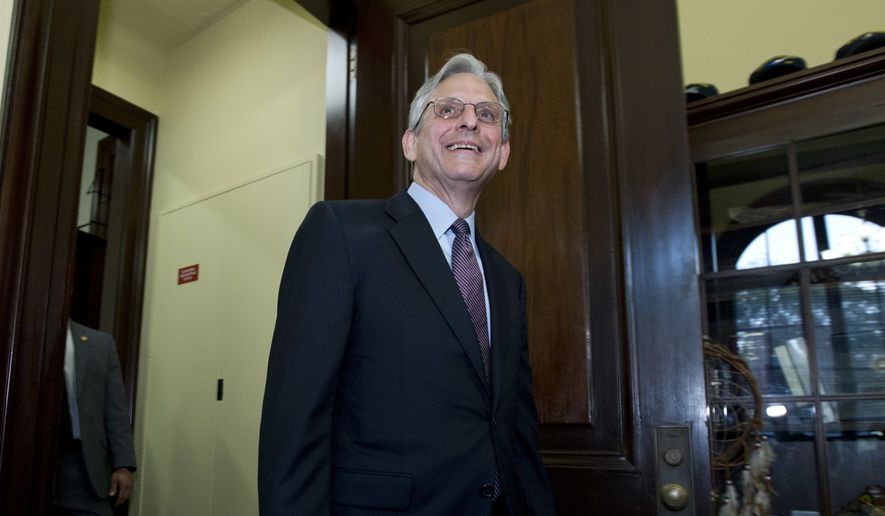OPINION:
While campaigning for president in 2008, Barack Obama promised to “fundamentally transform” America. And there can be little doubt that his vision is an America where the Second Amendment only applies to government officials, religious liberty exists only to protects private belief, unelected government agencies are given carte blanche to impose regulation on businesses and consumers, equal protection requires racial quotas, and the president can simply rewrite laws passed by Congress that displease him.
But this vision is squarely at odds with that of our nation’s Founding Fathers, who attempted to safeguard our liberties from such abuses through the U.S. Constitution. President Obama is well aware that the supreme law of the land constrains him from remaking the country in his own liberal image, and that to subvert it, stacking the court with liberal judges is an absolute prerequisite.
With the passing of strict constitutionalist Supreme Court Justice Antonin Scalia so near the end of Mr. Obama’s tenure, the fundamental balance of the court is in question. While the president has the constitutional power to nominate Scalia’s successor, many have argued that he should exercise his prerogative to leave such an important decision to the next president. After all, the Senate has a constitutional duty to give its consent, and the American people should likewise be given an opportunity to inform that consent through the upcoming election.
Mr. Obama’s ideological zeal precluded yielding to such a course, as nearly anyone could have predicted. Instead, the president nominated Merrick Garland, the chief judge of the U.S. Court of Appeals for the District of Columbia Circuit. Cognizant that Judge Garland must be confirmed by a Republican-majority Senate, the White House went into immediate overdrive to characterize him as a “moderate” and “centrist” judge. Dutifully parroting the administration, liberal media pundits declared that Republicans would be hard-pressed to reject such a middle-of-the-road selection and called for confirmation hearings to begin without delay.
But with each passing day, we learn a bit more about Judge Garland. What has come to light so far tells us that rushing the nomination process is precisely the route the Senate should not take. Indeed, what we are learning is that the labels “moderate” and “middle of the road” were a deceptive attempt at masking the true nature of a full-on liberal judge upon whom Mr. Obama can count on to secure a liberal majority on the court for many years to come.
According to a recent analysis examining hundreds of Judge Garland’s cases, the National Federation of Independent Business (NFIB) found that he ruled in favor of federal agencies 77 percent of the time and against businesses 90 percent of the time. In environmental cases, he sided with regulators nine out of 10 times while business were shut out 11 to zero. Environmental groups won 62 percent of their cases before him. Judge Garland ruled in favor of federal agencies in labor cases 79 percent of the time. While business lost 95 percent of labor cases, labor unions have never, ever lost a case heard by Judge Garland. The NFIB analysis asked “If that’s ’moderate,’ what is a liberal?” For this reason, the NFIB came out against Judge Garland, taking a stand on a Supreme Court nomination for the first time in its 70-plus-year history.
Judge Garland’s liberal judicial record goes even further. He has clearly demonstrated that he doesn’t feel bound by the Second Amendment. He voted to reconsider an important gun rights decision that had struck down Washington D.C.’s gun ban. A U.S. law prohibiting federal gun registration didn’t stop him from siding in favor of the Clinton administration-backed National Instant Check System, which retained registration data for six months.
A deeper look at Judge Garland’s record reveals not a compromise selection designed to put Republican senators on the spot, but a liberal judge not bound by the text of the Constitution or its limits.
In truth, his lifetime appointment would represent a perpetual threat to the notion of limited government. As The New York Times has pointed out, a Supreme Court with Merrick Garland will be the most liberal court in 50 years.
The American people are one vote away from having their religious liberties endangered, from government agencies being given a blank check to regulate business and consumers without the consent of Congress, from having our Second Amendment rights threatened, and from having other rights we take for granted kicked to the curb.
In attempting to secure liberal domination of the Supreme Court with another judge to rubber-stamp his left-wing agenda, the president is not treating his constitutional duty with the respect it deserves. The U.S. Senate must stand firm and not allow the president, on his way out of office, to solidify his legacy by creating the most liberal court in decades.
• J. Kenneth Blackwell, a former Ohio secretary of state, is a senior fellow for human rights and constitutional governance at the Family Research Council and a member of the policy board of the American Civil Rights Union.




Please read our comment policy before commenting.